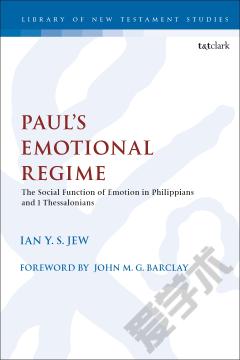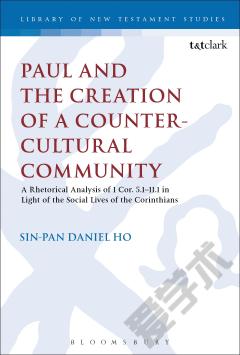Paul’s Emotional Regime —— The Social Function Of Emotion In Philippians And 1 Thessalonians
----- 保罗的情感状态:腓立比书和帖撒罗尼迦前书中情感的社会功能
This study is an investigation of the function of emotion in the social formation of the believers in the Pauline churches. In his letters, Paul speaks often of his own emotions, and also promotes certain emotions while banishing others; all this surely indicates that emotion has an important role to play within the believing community. However, in New Testament studies, the study of emotion is still at an embryonic stage. This thesis, which represents the first thesis-length treatment of emotion in the Pauline letter corpus, attempts to take the discussion forward. It argues that for Paul, emotions are integral to the proper formation and stabilizing of Christian identity and community, because they encode structures of belief and influence patterns of sociality. Chapter 1 reviews the nascent scholarship on emotion in Paulâs letters and the wider New Testament, and also surveys the state of play of emotions research in the sciences and social sciences. In chapter 2, we examine emotion in Stoicism, the dominant philosophical influence of the day, focusing particularly on joy and griefâthe two emotions that we take up and investigate exegetically in chapters 3 and 4, which concern, respectively, joy in Philippians, and grief in 1 Thessalonians. Finally, in chapter 5, we enlist the sociological notion of the âemotional regimeâ to explore how authorized emotions are constructed and reinforced in the Pauline communities. I conclude by offering an account of emotion in Paul, contrasting it with Stoic thinking. Taking its cue from current emotions research, which highlights the cognitive and social dimensions of emotion, this thesis proposes that as Paul sees it, right patterns of feeling stem from, and indeed embody, right patterns of belief, and that the social display of sanctioned emotions upbuilds the communal life of the believers. Furthermore, such right emotions, by squaring felt experience with held beliefs, and demarcating social boundaries between Christians and others, have powerful integrating and differentiating functions that profoundly influence identity and belonging. These conclusions have potentially far-reaching implications for our overall understanding of the social formation of the early believers, not least in terms of how a hitherto neglected aspect of that socializationâPaulâs emphasis on the affective dimensions of personal and communal lifeâis brought into active conversation with the theological realities that were believed to shape all of human existence and the practices that undergirded and sustained these beliefs.
{{comment.content}}








 京公网安备 11010802027623号
京公网安备 11010802027623号